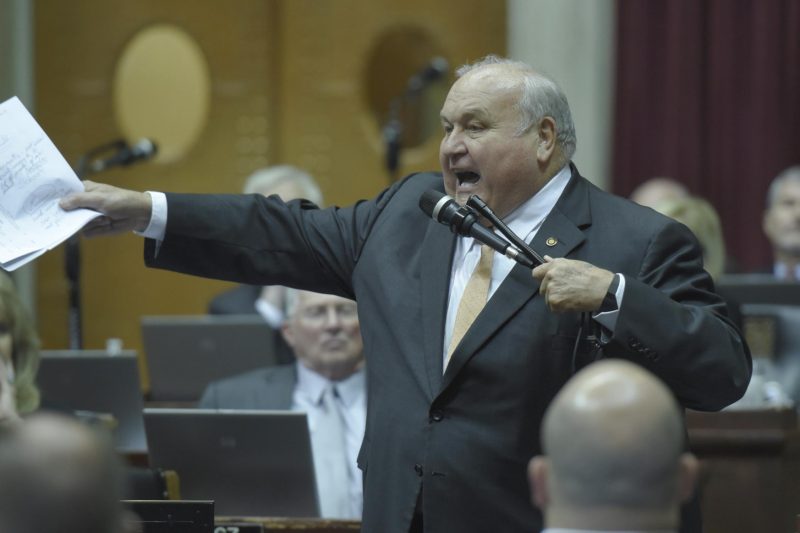JEFFERSON CITY, Mo. – Missouri lawmakers returned to the Capitol Monday afternoon to begin work on a special session called for by Gov. Eric Greitens in an effort to pass legislation that could potentially return jobs to the bootheel, a region still reeling from the loss of hundreds of jobs when Noranda closed.
The newly-drafted version of the amendment that had been previously attached SB 302 now returns to the legislature in the form of HB 1, filed by Rep. Don Rone.
Under the legislation, state statute would be revised and modified to allow lower electricity rates for two manufacturers looking to operate in southeast Missouri. Supporters of the bill say the companies, however, are not likely to move their operations to New Madrid unless cheaper electric rates and longer contracts can be negotiated, which requires changing of Missouri’s current laws.
But opponents of the bill – including some lawmakers – say that the proposed legislation opens the door to companies like Ameren, the largest electric company in the state, to raise their rates and bypass the Missouri Public Service Commission, the body that regulates investor-owned utilities.
Rone’s HB 1 works in two parts: it first allows for the PSC to authorize a special rate for an aluminum smelting or steel works facility, as long as the PSC determines that it is in the best interest of the state. The reduced rates would be allocated in a uniform manner to all customers, no matter which rate class they reside in, and the companies in question wold have to utilize a tracking mechanism approved by the commission, meeting their specific requirements. Any utility providing electrical service to such a facility would be able to do so under a rate schedule or a contract with the specially approved rates.
If the PSC approves that special rate, they cannot then modify or rescind that rate during its approved term, as stipulated by a provision in HB 1.
The second part of the bill applies to rate adjustment mechanisms for the utility companies.
“It shall be the policy of the state of Missouri for the commission to 2 regulate electrical corporations in a manner to best ensure safe, reliable, and affordable 3 energy for ratepayers through just and reasonable rates,” the bill states, and then goes on to say that in order to do that and “comply with this policy”, the PSC may “support expenditures” by corporations to maintain or improve the reliability, safety, security, or automation of electric infrastructure.
To do this, it says the PSC would be allowed to utilize the latest technology to meed the needs and expectations of customers, including partially forecasted test years, grid modernization incentive mechanisms, performance-based ratemaking, revenue decoupling, and decisional pre-approval with a post-construction review of construction projects.
Again, the same provision has been applied to this section as the first, stipulating that if approved by the PSC, it cannot be modified or stopped while still in the duration of its agreed upon term.
But the members of the Missouri House also filed four other versions of bills relating to utilities, smelters and steel mills. However, there’s no guarantee that the House takes any of those up, as the one bill that the session has been called for is that of Rone.
“All we ask for out of both people down on the other end of the hall to give the PSC the right to negotiate an affordable power rate,” Rone said during the session when he still remained hopeful the Senate would vote on SB 302. “[A smelter is] ready to open up the old Noranda facility in 120 days. My people lost 900 jobs, but we have the ability to bring back 500 of them.”
And as the language of the bill remains relatively unchanged from those that had been attached to SB 302, apart from the rearranging of a few items and exclusion or addition of some words, then it seems that the House bill remains something that members of the PSC could support.
Chairman Daniel Hall had released a statement during the session in regard to SB 302, saying “ I had serious concerns about 1028 and 190 because they restricted commission authority; but I do not have the same concerns about 302 because it gives us tools we can use at our discretion, after hearing all the evidence, after balancing all of the interests for purposes of setting just and reasonable rates in the public interest. This is consistent with the December 2016 Commission Report concluding our working docket on electric utility reform.”
The House committees on Utilities and Rules will take up HB 1 beginning Tuesday afternoon, and a vote is expected as soon as Wednesday before turning it over to the Senate.
To read through the bill’s language, click here.
You can also review the other four bills filed here:
Benjamin Peters was a reporter for The Missouri Times and Missouri Times Magazine and also produced the #MoLeg Podcast. He joined The Missouri Times in 2016 after working as a sports editor and TV news producer in mid-Missouri. Benjamin is a graduate of Missouri State University in Springfield.
















